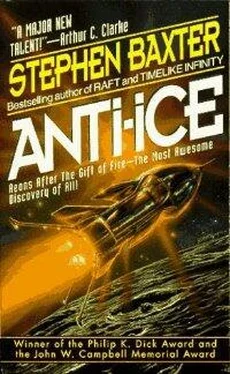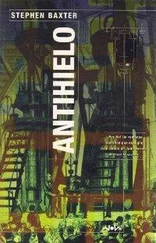And the people:
Father, they lay everywhere as they had fallen, men, women and children alike, their bodies twisted and cast down like dolls, their dumpy Russian clothing torn, bloodied and smouldering. Somehow the attitudes of these unfortunate corpses made them seem less than human, and I felt only a sickened numbness.
Then we met our first living Russian.
He came limping through a doorway which no longer led anywhere. He was a soldier—an Officer, for all I could tell—and around me I could hear chaps murmuring and fingering their arms. But this poor fellow had lost his cap, carried no weapon of any kind, and, one foot dangling behind him, was managing to walk only by supporting himself on a crutch improvised from a piece of timber. The Captain ordered us to shoulder arms. The fellow began to jabber in that guttural tongue of theirs, and gradually the Captain worked out that there were several people, perhaps a dozen, trapped in the wreckage of a schoolhouse, some hundreds of yards away.
A detail of chaps was issued with shovels and other gear and sent with the Russian.
And so it went, for the next several days. Father, as far as I know not a shot was fired in anger in Sebastopol after the falling of the anti-ice shell; instead we worked side by side with the Russian survivors—and with the French and Turks—in the guts of that felled port.
I remember a child, lying on her back, a red scarf wrapped around her head. She held one hand up to the sky which had betrayed her, and her fingers burned like candles. One chap came out of the wreckage of a sailmaking factory, hauling himself by his arms only; he left a red, glistening trail as he moved, like some ghastly slug…
Father, I have chosen to relate these things to you; but I know that you will not allow Mother or young Ned to become distressed by a repetition of this account.
The greatest single labor was clearing the corpses; but this we could not achieve fast enough. After a few days under the hot Crimean sun the stink of the place was impossible to bear; and across our mouths we all wore kerchiefs soaked in “raki.”
The strangest sight I saw came after a few days, when I was sent into that crater at the heart of the town. We had to wrap soaked rags around our boots as, even then, the masonry was still hot enough to burn the skin. Here I found a slab of wall which poked like a large, irregular tombstone out of the shattered earth. This wall was uniformly blackened—save for an oddly shaped patch close to ground level; and this patch, I realized after some time, was in the shape of an old woman, making her painful way along the street.
Father, the wall bore the shadow cast by that poor lady in the light of the anti-ice shell. Of the lady herself there was of course no sign; and neither did we find any survivors in that part of the city.
More than once I came across the engineer, Traveller, laboring with the rest of us; and once I saw tears coursing down his grimy cheeks. Perhaps, we speculated, even he had not appreciated the devastation to be achieved by his invention. I wondered how this Traveller would spend the rest of his days; and what other miracles—or curses—of anti-ice he might spawn.
But I did not approach him, and I know no one who did.
There is little else to say, dear Father. I was relieved of my work in Sebastopol once fresh troops and equipment arrived from Britain and France; now, after nine or ten days, the town—though wrecked—is a little less like a scene from the “Divine Comedy;” and the harbor is beginning to function again.
The months of siege are, of course, at an end, and the war is won. But since our occupation of the town we have learned that prior to the anti-ice bombardment the Russians were already losing a thousand lives a day, thanks to our artillery shots and the various privations they suffered. Their mood apparently had been growing increasingly desperate, and—I am told—their Officers had been considering a final gamble, a break-out and assault which, I am confident, we could have fielded and so won the war.
So, Father—did the anti-ice have to be used? Could we have won without such suffering among the population of the town?
I fear that only God, the Master of more Worlds than this, knows the answers to such questions.
As to myself: the Doctor has told me that I should regain partial use of my burnt hand, with time, though it will never be a pretty sight, and I will never hold a fiddle with it! And speaking of pretty sights—I must report this in advance of the meeting and reconciliation between us which, I hope, will one day come—I fear that my face has been scarred by the anti-ice flames, and will remain so marked throughout my life—all save the distinctive and quite unmistakable shadow of the hand which I had held cupped over my eyes, at the moment when that unusual shell fell on Sebastopol.
Father, I will close now. Please forward my love and devotion to Mother and Ned; as I say, I hope to see you all once more, if you will have me, on my return to England; at which date I will be able to thank you, Father, for the reparations you have made to the young lady whose honor I so carelessly mistreated with the actions of my youth.
May God keep you, Sir.
I Remain, with Love,
Your Devoted Son
HEDLEY VICARS
1
AT THE NEW GREAT EXHIBITION
It was at the opening of the New Great Exhibition, on the 18th of July 1870, that I first encountered the famous engineer Josiah Traveller in person, although I had grown up with my brother Hedley’s tales of the devilism wrought by Traveller’s anti-ice in the Crimean campaign. Our first meeting was brief enough and quite overshadowed in my mind by the wonders of the Crystal Cathedral and all it contained—not to mention the beautiful face of one Françoise Michelet—and yet the chain of events initiated by that first casual encounter were to lead link by link into the astonishing adventure which would lift me above the very stratosphere; and plunge me at last into the depths of a man-made hell at Orléans.
In that climactic year of 1870 I was a junior attaché to the Foreign Office. My father, despairing of my shallow character and shallower intellect, had been eager to find me a role in which I would be of significant service to the country. I believe he had toyed with the idea of purchasing a commission for me in one or other of the Services; but, blighted as he was by Hedley’s Crimean experiences, he had decided against that course. Also I have always shown a certain facility with languages, and Father vaguely imagined that might be useful in overseas postings. (He was wrong, of course; English remains the common tongue of the civilized world.)
And so a diplomat I became.
You must picture me, then, at the age of twenty-three, somewhere beneath the bottom rung of the great Ladder of Diplomacy. I was five feet ten inches in height, of slender build, fair-haired and clean-shaven—of acceptable appearance, if I may say so, if not noticeably overbright. I was not long down from college but already rather bored by my work, which largely consisted of desk-bound paper-shuffling in a congested office deep in the bowels of Whitehall. (I had been looking forward to a posting to the capital, Manchester, but I soon learned that London had remained the administrative hub of the Empire, despite its reduced national status.) How I anticipated my first overseas posting! As I stared sightlessly at my blotter I strolled before the bejeweled palaces of the Raj princes; I confronted the wild Indians of Canada armed with nothing but Treasury tags and crocodile clips; and my teacup was a schooner in which I sailed in the wake of Cook into the dusky arms of South Pacific maidens.
With all that to do each day I didn’t complete a great deal of work; and Mr. Spiers, my superior, soon began to show dangerously high steam levels.
Читать дальше












